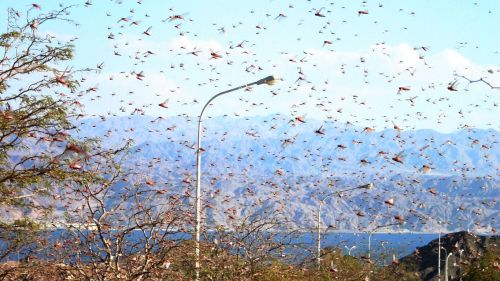The Impact of COVID-19 on the Future of Food Systems in Africa

How could the effects of the COVID-19 pandemic lead to reduced food production and more food insecurity?
COVID-19 Pandemic
The world is facing a crisis that will impact our health, economies, food imports, and production. The threat to food security in Africa and by extension the whole world started with the locust infestation of East Africa: a plague of locusts spreading across the region and may move to other parts of Africa if nothing is done early enough; threatening the livelihood of poor masses. According to the UN, an average swarm, which contains up to 40 million insects, can travel up to 150 km in a single day and can devour enough food to feed 34 million people within that time. As if this is not enough, then comes COVID-19; a pandemic ravaging the health of many in the world presently. Many people with proven knowledge to contribute to food security in the world have been and are being lost daily to this virus that has defied seemingly every effort, and world powers in science and technology are not immune from this.
Implication on Agriculture
With the trend in countries that have been battling the Covid-19 in the past weeks, governments, donors, companies, and individuals will be shifting funding and attention from other sectors of the society to the health sector, in a bid to save lives. This, in turn, could mean reduced food production, which will cause the force of demand and supply to bring about an increase in food price, and increase in the number of people who cannot afford their daily meals.
In the face of these confusion and apprehension, our deep thought should be directed towards the economic implications of this pandemic, and the ripple effects on individuals, families, businesses, economies and countries. For instance, in Nigeria, the budgetary assumption was based on an oil price of $57 per barrel, but the price has dropped to about $20 per barrel, and the end of the drop is not in sight. This, in turn, will affect the monthly allocation to states and local governments in the country and by extension, workers’ salaries, and if workers are not paid, efforts put by farmers to produce food will result in waste due to the loss of purchasing power.
This will create a ripple effect of food waste, which in turn can likely lead to another pandemic such as a cholera outbreak. This suggests that governments, stakeholders and institutions need to pay attention to the post-harvest sector of the agriculture industry. We also need to strike a balance between the focus on health which is important at this time, and agriculture which we cannot do without.
A Way Forward
The economic impact of a disaster like this usually lasts longer than the plague itself, with the worst impacts affecting the developing nations, and inadvertently the poor masses. This is a time when digital agriculture can be harnessed and utilized to the fullest advantage. Several digital technologies can be deployed to ensure that smallholder farmers across Africa continue to have access to information that will help with the production of food and activities along the value chain.
It is time Africa starts looking inward to adopt some of the digital technologies like mDairy, Zenvus, Twiga, SmartMoney and Trotro among others being developed by young Africans that can be used to address food security, zero-hunger and we can also use them to sensitize rural communities about Covid-19; its symptoms, precautionary measures, and what to do in case of incidence.
Like China is using technology to track the population’s movement in some of the cities during this period, Africa can adopt digital agriculture to improve food production and avert a likely famine in some parts of the Continent.
Africa’s locust outbreak reveals the need for an integrated approach, supported by strong partnerships and increased donor funding to make agriculture more resilient.
We also need to encourage backyard or urban farming, so we can set up mini farms around our residential spaces. If hunger is resolved, poverty is dissolved.
COVID-19; be fearless but not careless.
Next Generation series
The Chicago Council's Center on Global Food and Agriculture is pleased to present a blog series featuring perspectives from our Next Generation Delegation Alumni on the food security effects of COVID-19. This piece, which is part of that series, is from 2018 Next Generation Delegate Oyewale Abioye.